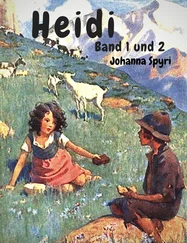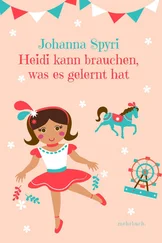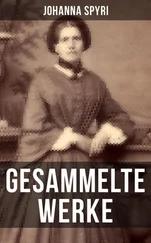
‘Can you remember whether you’d had a dream? One perhaps that seemed very real?’
‘Oh yes.’ Heidi’s eyes met his. ‘I dream every night that I’m back with Grandfather and can hear the wind whistling through the fir trees. I know in my dream the stars must be shining brightly outside, and I get up quickly and open the door of the hut — and it’s so beautiful. But when I wake up I’m always still here in Frankfurt.’
Introduction by Eva Ibbotson
When I was seven years old I had to flee from Austria, where I was born, and seek refuge in England.
I was lucky — all my family escaped from Hitler — but I was terribly homesick. Until then we had spent summer in the freedom of the mountains, and now I was in a crowded and dirty part of London, shut in by high walls.
Then one day my grandmother took me to the public library, and there on the shelf was Heidi . I pounced on it: the picture on the cover was of a young girl sitting in a flower‐filled meadow, inside were illustrations of rampaging goats, a hawk circling the high peaks… I had read the book in German, now I had to learn English quickly so that I could read it again — and when I had done so I felt a wonderful sense of homecoming. It was all there, everything I yearned for and remembered: the rocky peaks turned to rose when the sun went down, the neat wooden houses, the brilliant stars. And the sound of the wind in the fir trees, which will follow Heidi in her dreams wherever life will take her.
But of course it is not only the landscape that makes Heidi so rewarding. The book tells a robust and splendid story. It may have been written more than a hundred years ago but it has everything you could want from a book: a heroine who knows how to take joy when she finds it, but can endure hardship bravely when, for a time, it comes her way; a most satisfactory ogre — her grandfather — who like all the best ogres has a heart of gold; a boy who, in spite of his oddities, becomes her friend. The middle part of the book contains the best description of homesickness I have ever read — and there are plenty of twists and surprises that propel the story forward to a happy ending, the kind of ending which doesn’t shut like a trap but allows you to go on dreaming and speculating and wondering.
When the book was first published it was an instant success. Girls everywhere were christened Heidi. The book has been filmed again and again, it has been adapted for television, and has given birth to numerous sequels — and no wonder, as children refuse to take leave of the characters they have learned to care about.
I don’t think this great success is at all surprising. Heidi is about something that all of us understand and value: the love that people bear for their particular corner of the world — a world made up of simple things: flowers and snow and wind; courage and friendship and thrift.
My family were not farmers or mountaineers: I have never in my life milked a goat or chopped wood to light my stove and I shudder to think what would happen if I tried to make cheese. But when I pick up Heidi to read it yet again, and travel with the heroine as she makes her first journey up the mountain, I know that I’ve come home.
The pretty little Swiss town of Mayenfeld lies at the foot of a mountain range, whose grim rugged peaks tower high above the valley below. Behind the town a footpath winds gently up to the heights. The grass on the lower slopes is poor, but the air is fragrant with the scent of mountain flowers from the rich pasture land higher up.
One sunny June morning, a tall sturdy young woman was climbing up the path. She had a bundle in one hand and held a little girl about five years old by the other. The child’s sunburnt cheeks were flushed, which was not surprising, for though the sun was hot she was wrapped up as though it was mid‐winter. It was difficult to see what she was like for she was wearing two frocks, one on top of the other, and had a large red scarf wound round and round her as well. She looked like some shapeless bundle of clothing trudging uphill on a pair of hobnailed boots.
After climbing for about an hour, they came to the little village of Dörfli, half way up the mountain. This was the woman’s old home, and people called to her from their houses all the way up the street. She did not say much in reply but went on her way without stopping until she reached the last house. There a voice from within hailed her. ‘Half a minute, Detie,’ it said, ‘I’ll come with you, if you’re going any farther.’
Detie stood still, but the little girl slipped her hand free and sat down on the ground.
‘Tired, Heidi?’ Detie asked her.
‘No, but I’m very hot,’ the child replied.
‘We’ll soon be there. Just keep going, and see what long strides you can take, and we’ll arrive in another hour.’
At that moment a plump, pleasant‐faced woman came out of the house and joined them. The little girl got up and followed as the two grown‐ups went ahead, gossiping hard about people who lived in Dörfli or round about.
‘Where are you going with the child, Detie?’ the village woman asked after a while. ‘I suppose she’s the orphan your sister left?’
‘That’s right,’ Detie replied. ‘I’m taking her up to Uncle. She’ll have to stay with him now.’
‘What, stay with Uncle Alp on the mountain? You must be crazy! How can you think of such a thing? But of course he’ll soon send you about your business if you suggest that to him.’
‘Why should he? He’s her grandfather and it’s high time he did something for her. I’ve looked after her up to now, but I don’t mind telling you, I’m not going to turn down a good job like the one I’ve just been offered, because of her. Her grandfather must do his duty.’
‘If he were like other people that might be all right,’ retorted Barbie, ‘but you know what he is. What does he know about looking after a child, and such a young one too? She’ll never stand the life up there. Where’s this job you’re after?’
‘In Germany,’ said Detie. ‘A wonderful job with a good family in Frankfurt. Last summer they stayed in the hotel at Ragaz where I’ve been working as chambermaid. They had rooms on the floor I look after. They wanted to take me back with them then, but I couldn’t get away. Now they’ve come back and have asked me again. This time I’m certainly going.’
‘Well, I’m glad I’m not that poor child,’ said Barbie, throwing up her hands in dismay. ‘Nobody really knows what’s the matter with that old man, but he won’t have anything to do with anybody, and he hasn’t set foot in a church for years. When he does come down from the mountain, with his big stick in his hand — and that doesn’t happen often — everybody scuttles out of his way. They’re all scared stiff of him. He looks so wild with those bristling grey eyebrows and that dreadful beard. He’s not the sort of person one would want to meet alone on the mountain.’
‘That’s as may be, but he’s got to look after his grandchild now, and if she comes to any harm that’ll be his fault, not mine.’
‘I wonder what he’s got on his conscience to make him live all alone up there, and hardly ever show his face,’ Barbie wondered. ‘There are all sorts of rumours, but I expect you know the whole story. Your sister must have told you plenty about him, didn’t she?’
‘Yes, she did, but I’m not telling. If he heard I’d been talking about him, I should catch it all right.’
Читать дальше
Конец ознакомительного отрывка
Купить книгу













